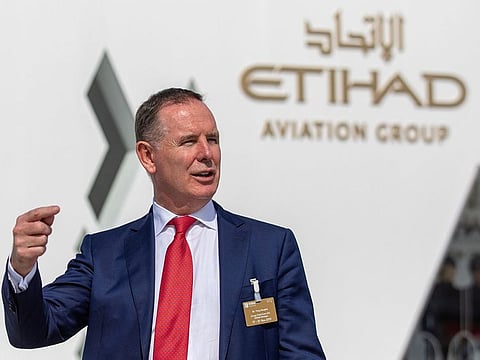Abu Dhabi’s Etihad airways is operating close to its full network, but is flying fewer passengers: CEO
The carrier has no visibility on the delivery of Boeing 777-9x aircraft

Also In This Package
Dubai: Abu Dhabi’s Etihad airways is accelerating with its plans of becoming a mid-sized carrier. The airline, which was hit hard by the pandemic, will bring its Airbus A350-1000s into service next year.
Etihad took delivery of two of the wide-body aircraft in 2021 and is looking to schedule the planes into service next year, according to Tony Douglas, Etihad’s CEO.
“We took a decision to park our Airbus A380s. We got out of Boeing 777s as one of our aircraft types, as well as the Airbus A330,” said Douglas during a webinar hosted by Simple Flying. “We elected to consolidate, around a very efficient and sustainable fleet of Boeing 787s (along with) the A350-1000s.”
The delivery of the Boeing 777-9x seems to have hit a snag, though.
The 777-9x, the world’s longest and largest twin-engine jet, is an “incredible aircraft on paper because the programme hasn't got into a delivery window,” said Douglas. “It represents such a great proposition - at this point in time, I don't know when deliveries of that aircraft are going to be confirmed.”
In 2013, Etihad ordered 17 of the 777-9x and eight of the 777-8x aircraft. Later, the airline announced purchase rights for 12 additional jets.
We really pushed really hard in making some of the tough decisions that we were going to make anyway, even sooner. We've had to take over 10,000 members of the Etihad family out over the course of the last year as well. We are leaner, we're more agile, and we're still hunkered down.Tony Douglas, CEO of Etihad
Full network
Etihad is operating close to 100 per cent of its pre-COVID network.
“But load factors have been heavily impacted,” said Douglas.
Etihad’s load factor - percentage of available seating capacity that is filled with passengers– stood at just 25 per cent in the early part of the year and is now about 40 per cent.
Never say never
The Etihad chief hinted that if it ever became economically viable, the A380 could make a comeback.
“If it can be economically viable to get them back into the air, nothing would give us greater satisfaction,” said Douglas.
“The simple reality is, however, anything with more than two engines simply doesn't work. the cost of operation, the fuel burn is simply no longer competitive or even close to being competitive,” he added.
Indian market
Douglas said that India is a big market for Etihad and its newly-formed venture Air Arabia Abu Dhabi.
“The Indian subcontinent in general is the biggest source market, given geographically the proximity and the size of the population and the growth,” said Douglas. “We put extremely high focus upon connectivity into India, not just with Etihad, but also with Air Arabia Abu Dhabi”
Sign up for the Daily Briefing
Get the latest news and updates straight to your inbox









